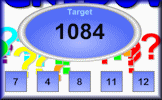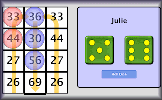You are a lobster fisherman. You’ve inherited your grandma’s 10 lobster pots but no money. Can you make your fortune in a fortnight?
In the morning you take your pots out, either into the bay, or right out to sea. In the evenings you collect them back in, and see what you’ve caught. On a calm day, pots in the bay earn £3 each. Pots far out at sea earn £9 each, as the bigger lobster lurk out there.
BUT if the weather is stormy, the lobster are driven back towards land. Then pots in the bay earn £9 each, whereas pots out at sea earn no money, and in fact the pot itself is broken up or washed away, and lost. You will have to decide your appetite for risk: do you want a safe small profit, or the chance of a bigger one?
At the end of the day you cash up the money you’ve earned from the day’s fishing, both in the bay and out at sea, and your day’s balance includes what you’ve earned that day, plus what you had in the bank at the start of the day. You keep all the pots that were not washed away to sea, and once you’ve calculated your current money and pots you have the opportunity to buy more pots. This is the balance you take forward to the next day.
The weather is unpredictable, but more likely to be similar to what it has been like today. As Monday dawns, the weather is calm, but at level 3. Choose where to put your pots before rolling the weather dice! This dice tells you how the weather changes that day. The dice can send the weather up 1, 2, or 3 points towards stormier weather, or down 1, 2, or 3 points towards a dead calm. (The weather marker can’t go off the chart, so for example if it is on 6 and you roll a +2, it just stays on 6.) Over the weekend the weather resets to Calm 3 ready for Monday morning.
If a storm washes away your pots at sea, cross them through so that you remember they are lost.
You don’t have to set out all your pots. For example, if you have 10 pots you can just place 6 in the bay. But of course pots are safe in the bay – they can’t be lost and they guarantee a return, so it is better to put them all to use.
If you run out of both money and pots, you may take out a bank loan and buy 10 more. Of course this will give you a negative balance (of -£80 or near that). Can you make enough to pay back the loan?
On your very last go, you might like to sell back your pots to the bank (at £8 each) to maximise your profits. What do you think are the best tactics?

















Jen Pawsey,
Wednesday, July 2, 2025
"I hugely recommend this game. It looks so dull, like a form to fill in, and yet it depends so much on the personality and attitude to risk of the players. It is almost always the student's favourite game."
Perplexity,
Wednesday, July 2, 2025
"This game is well-known in UK schools and is used to reinforce mathematical skills such as probability, times tables, and decision theory. It is described as a collaborative and strategic game that engages students in logical thinking and planning. Despite its popularity and widespread use, no definitive origin or creator has been identified."